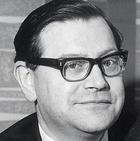
John Braine was born in 1922 in Bingley, a small town near Bradford, in the county of Yorkshire (England).
After dropping out of school at sixteen, he spent his youth doing rather uninspiring jobs, such as clerk in a store, laboratory waiter, and factory worker, after which time he became a librarian's assistant. During World War II he served in the Royal Navy. In 1951, tired of his job, which did not bring him any satisfaction, he decided to leave everything and devote himself to writing full time. He tried first to carve out a future for himself as the author of stories and then as a radio journalist and reporter for various magazines, such as the New Stateman, but he failed miserably. After falling ill with tuberculosis, he decided to return to the relative safety of his civil service position. During the convalescence of his illness, which lasted eighteen months, he began to write the work that would bring him to fame: A place at the top (Room at the Top, 1957). The novel, which was rejected by four publishers before being published, garnered almost instant success, integrating it in its own right into the "Angry Young Men" literary movement, to which authors of the stature of Kingsley Amis also belonged, Philip Larkin, Keith Waterhouse or Allan Sillitoe. The novel garnered critical acclaim, and quickly hit the bestseller lists (reissued eight times in the first year, reaching its nineteenth reprint in 1970). The Penguin publishing house would place it among its best-selling titles of all time, along with works such as Lady Chatterley's Lover and The Odyssey. In 1959 the novel was adapted into film by Jack Clayton. Braine then decided to return to writing full time and moved to London. However, as much as he tried to write some other novel that equaled the success of the first, he never succeeded, not even when he published, in 1962, its sequel, Life at the Top. In 1968 he would publish the novel The Crying Game, set in London and which in a way sought to capture the atmosphere of the "Swinging Sixties". Braine, who in his early years embraced the Labor cause, would gradually go for more conservative positions, just as generation companions like Kingsley Amis did. He died of a stomach ulcer in 1986 in London.




